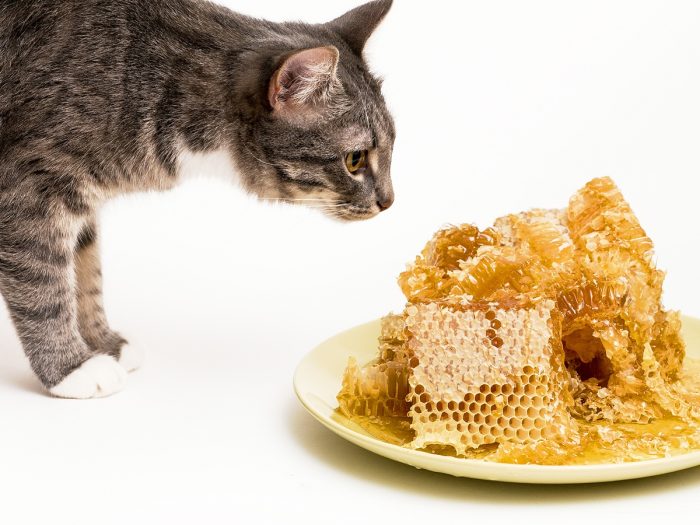When cats eat honey, it may be a cause for concern to some feline owners. Honey may be a nutritious dietary element for humans, but cats and humans are very different, so it’s important to understand the risks and potential benefits before you let your cat lick your spoon!
Can Cats Eat Honey?
While honey is not strictly considered a toxic food to cats, it is generally not recommended except in very small amounts. Cats have an extremely small digestive system, as well as a small mouth and throat, both of which mean that honey can be a problem. Even when humans eat too much honey in a short period, it can cause a stomachache, so that effect is magnified in cats. Certain feline friends will have almost no tolerance for honey and will make their distaste known by simply avoiding the food. Other cats may be more receptive, and provided they don’t show any negative side effects, it can occasionally be used as a tiny treat. The other good thing about cats is that they are picky, slow eaters. So, if they happen to find an open honey jar, they won’t knock it over and gorge themselves – as a dog might. [1]
Cats can eat honey when they’re sick, particularly with a sore throat or inflammation in their respiratory system. This can be difficult to diagnose at home, but if your cat seems unwilling or unable to eat their food normally, adding a few drops of honey to some wet food can help to clear up the discomfort. Again, pay attention to how your cat responds, and only use honey in moderation.

You can give your cats a spoonful of honey every day. Photo Credit: Shutterstock
How Much Honey Can Cats Eat?
Some experts recommend that cats avoid honey altogether, but others argue that there is no clear toxicity to cats. Honey does have many potentially beneficial nutrients, such as iron, zinc, copper, potassium, low levels of protein, hydrogen peroxide, antioxidants, and vitamin C. [2]
Despite the potential risks to your cat’s digestive health, it is likely safe to give your cat 1/2 teaspoon of honey per day, particularly when using it for medicinal purposes. In other cases, you can let your cat lick the excess of a spoon, or add a drop or two on top of their food. However, honey should be viewed as a rare treat.
Honey for Cats with Allergies
For humans, honey has the unique ability to partially suppress the immune system and help to relieve allergic sensitivity and reactions. If your cat also suffers from allergies, a small amount of honey may be able to help provide some relief. By optimizing the immune system and filling the body with antioxidants, honey can improve the efficiency of the body, while also treating some of the symptoms of allergic reactions in your cat. As mentioned before, when cats eat honey, it can interfere with their digestive processes. So caution is highly recommended. [3]
